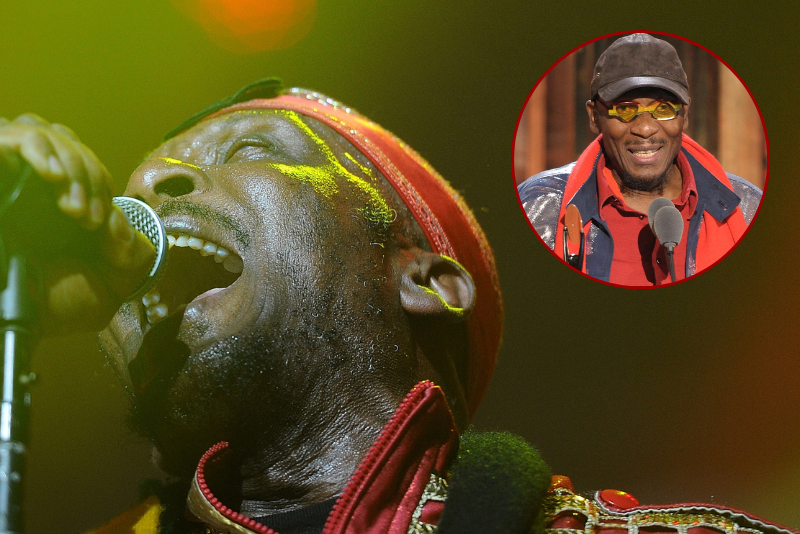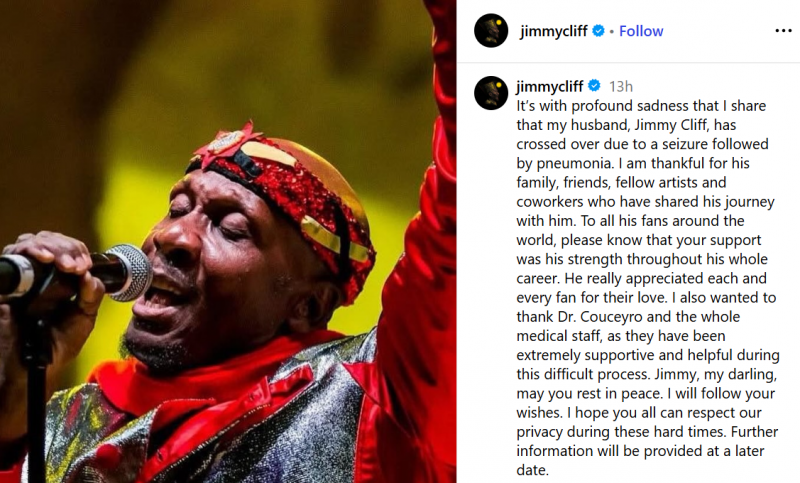
OAN Staff Brooke Mallory
4:09 PM – Monday, November 24, 2025
Jimmy Cliff, born James Chambers, the trailblazing musician from Jamaica whose soulful voice and peace-themed lyrics propelled the genre from the island’s streets to international stardom, died on Sunday at 81-years-old.
At age 14, Cliff released his first hit “Hurricane Hattie,” and he represented Jamaica at the 1964 World’s Fair. His music often carried a deeper message about standing up for the underdog.
Latifa Chambers, Cliff’s wife, announced his death in a statement on his Instagram page on Monday.
“It’s with profound sadness that I share that my husband, Jimmy Cliff, has crossed over due to a seizure followed by pneumonia,” Chambers wrote. “I am thankful for his family, friends, fellow artists and coworkers who have shared his journey with him,” she continued. “To all his fans around the world, please know that your support was his strength throughout his whole career. He really appreciated each and every fan for their love. I also wanted to thank Dr. Couceyro and the whole medical staff, as they have been extremely supportive and helpful during this difficult process.”

Born in 1944, in the rural parish of St. James, Jamaica, Cliff grew up in modest circumstances, writing his first songs as a child inspired by a neighbor’s sound system. At 14, he moved to Kingston, adopting his stage name of Jimmy Cliff and immersing himself in the fast-paced ska and rocksteady scenes that would later evolve into reggae.
Cliff’s career ignited in the early 1960s with hits like “King of Kings,” produced by Leslie Kong. By the mid-1960s, he had signed with Island Records, releasing his debut album “Hard Road to Travel” in 1967. His breakthrough international single “Wonderful World, Beautiful People” (1969) captured both the optimism and struggle of Jamaican life, while his anti-war anthem “Vietnam” (1970) earned praise from artists like Bob Dylan.
Additionally, no figure embodied reggae’s cinematic rise more than Cliff’s starring role in “The Harder They Come,” a 1972 crime drama directed by Perry Henzell. As the film’s protagonist, the aspiring singer Ivanhoe “Rhyging” Martin, Cliff delivered a performance that appeared to mirror his own real-life journey into stardom.
The soundtrack, featuring tracks like “You Can Get It If You Really Want” and “Many Rivers to Cross,” became a global hit, introducing reggae to audiences in the U.S., Europe, and throughout the world.
Over five decades, Cliff’s catalog blended ska, rocksteady, reggae, and soul, yielding timeless covers and originals. His rendition of “I Can See Clearly Now” topped charts in 1993 for the film “Cool Runnings,” while “Hakuna Matata” (1995) added his voice to Disney’s “The Lion King.” Collaborations spanned genres — from Kool & the Gang in the 1980s to Tim Armstrong on his 2011 album “Rebirth.”
Cliff’s accolades included two Grammy Awards for Best Reggae Album, “Cliff Hanger” (1985) and “Rebirth” (2012), along with seven nominations. He was also inducted into the Rock & Roll Hall of Fame in 2010, being one of only two Jamaicans alongside Bob Marley, and he received Jamaica’s Order of Merit in 2003 — the nation’s highest honor for contributions to the arts.
In addition to music, Cliff acted in films like “Club Paradise” (1986) with Robin Williams and he lent his voice to different causes worldwide, from Nicaragua’s 1990 elections — where his tune “You Can Get It If You Really Want” became a campaign anthem — to performances at the 2002 Commonwealth Games and the 2007 Cricket World Cup.
Cliff is survived by his three children, among them the 33-year-old actress and singer Nabiyah Be. He leaves an enduring legacy as one of the greatest ambassadors of Jamaican music and culture to the global stage.
Stay informed! Receive breaking news blasts directly to your inbox for free. Subscribe here. https://www.oann.com/alerts
What do YOU think? Click here to jump to the comments!
Sponsored Content Below

